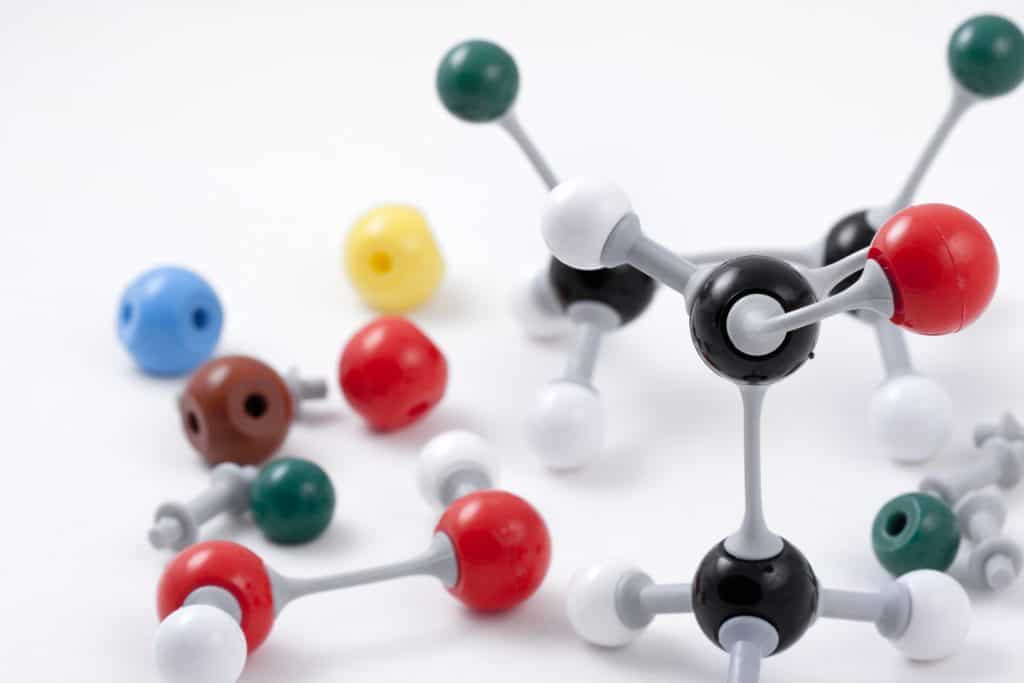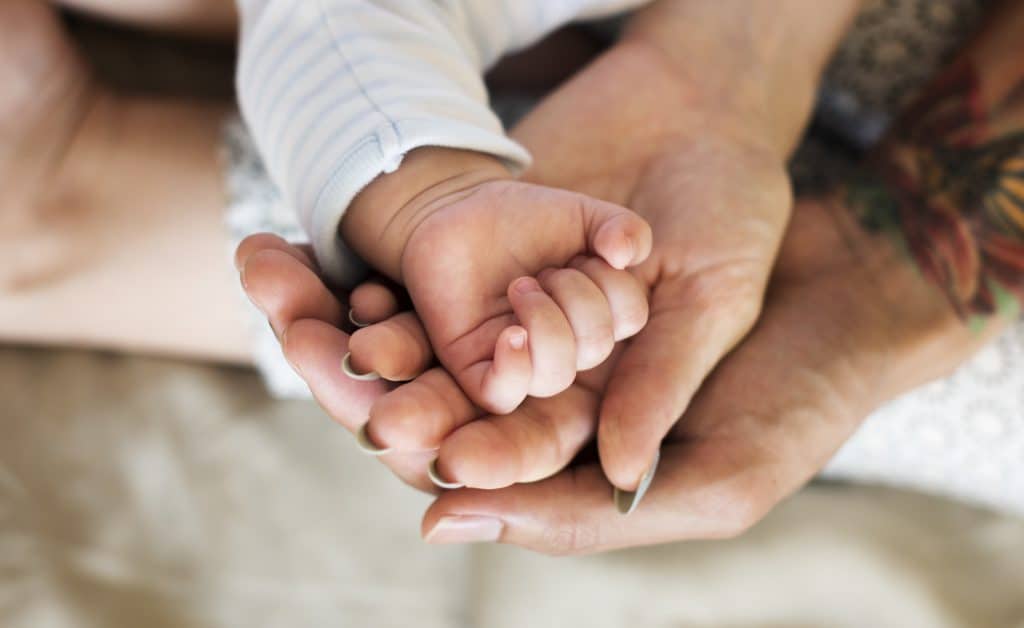Imagine:
You’re the proud mother or father of a brand spanking new baby, hot off the presses. First off – congratulations. I’m sure you can’t contain your exuberance.
But doubt flashes through your mind as you go to douse yourself in your new luxury Louis Vuitton perfume. Is it really safe and healthy for a baby to inhale such a potent scent? You rush to Google, and here you are.
So, is it safe for a baby to be around perfume?
If you have a fragrance habit bordering on addiction like me and can’t live without your daily spritz of ‘fume, you might be in for some bad news.
Although the science is mixed on the matter, studies have shown that ingredients in perfumes can affect hormone development in newborns. Furthermore, babies are sensitive to strong smells, so perfume might overwhelm them. Exercise caution when you wear perfume around your baby.
Let’s take a closer look at why wearing perfume around your baby might have a detrimental effect.
Risks
First and foremost, let me say that these are, of course, potential risks. If you have a newborn child and have been wearing perfume around them, don’t panic. While there are harmful effects associated with wearing perfume near babies, they do not affect every individual in the same way. It is likely that your baby will be fine, so long as you’re not gassing them out with your scent.
However, you would do well to inform yourself about the possible risks and negative side effects of perfume inhalation for infants.
Infant Sensitivity
Infants are very sensitive to smell, more so than even small children and adolescents.
Remember that shortly after birth, a baby’s body is just getting into the swing of things.
Their senses are being overloaded with new stimuli that they’ve never experienced before every single day. That’s partially why babies cry so much, and tend to get sick much more easily than adults – everything is new, and everything is overwhelming.
New sights, new sounds, new sensations, and yes, new smells.
Throwing a powerful perfume into the mix would come as rather a palpable shock to the system.
Just think, even adults can have intense reactions to perfume. A baby would experience many orders of magnitude more than that.
Perfume can cause headaches, irritation, inflammation, coughing, intense allergic reactions, and even asthma attacks in infants. These are not things you want to put your child through.
More than that, infants are held very close to the body, far closer than the people at the office who might catch a whiff of your perfume in the air. They will be getting the full experience of your perfume right in their noses, not the trail you leave behind as you walk by Sharon’s desk.
If you must wear perfume when taking care of your child (and believe me, I understand the desire to always be scented, I really do), the least that you could do to is to reign in the number of sprays you apply (say 1-2 instead of 5-6), and spray under your shirt or in areas far away from the infant’s nose.
Effects on Development
Phthalates and Hormonal Development

Most every modern perfume on the market consists of a combination of alcohol (or a carrier oil), essential oils, and synthetic aroma chemicals.
Chemicals being in perfume is not necessarily a bad thing. Perfumes have been made with the addition of chemicals for over a century now, and, contrary to what you might think, natural ingredients are often the source of allergic reactions in some perfume users.
However, that is not to say that exposure of newborns to chemicals is a good thing either. In fact, there is quite a bit of evidence that it is not a good thing.
The culprit is an ingredient in perfume and other cosmetic products called phthalates (I’ll let you figure out how to pronounce that).
Studies have shown that phthalates are what are known as an endocrine disruptor – effectively, a substance that affects endocrine functions in humans, especially hormonal development.
Phthalates have been shown to particularly affect male infants, and excessive exposure to phthalates in the critical early stages of life can hamper sexual development in males. Phthalates effectively act as the female hormone estrogen in the endocrine system, disrupting the production of testosterone.
Some have even linked phthalates in food, cosmetics, and toys to the global drop in male fertility which has manifested over the years, though further study is required.
Phthalates and Neurodevelopment
There is also evidence to suggest that phthalates, in addition to other chemicals used in perfumery such as aldehydes, ethyl acetates, and acetones can have a negative influence on neurodevelopment as well.
Excess exposure to these chemicals has the potential to stunt neuronal functions and synapse numbers in young minds, resulting in an adverse effect on cognitive and motor development. Some studies have drawn a tenuous connection between phthalate exposure and ADHD and autism.
Others have linked phthalate exposure to metabolic disorders, diabetes, respiratory disorders, allergies, and the worldwide obesity epidemic.
There are unfortunately some major difficulties that present themselves to researchers studying phthalates and their effects.
One is that phthalates are present in a vast number of products, not only perfume and cosmetics, from canned food, to medical equipment, to children’s toys. This makes identifying the source of phthalate exposure and proscribing a remedy to the problem a challenge.
Another issue is the symptoms of phthalate exposure might not appear until years or even decades later. With so many products containing phthalates, it might be difficult to discern whether the cause of a particular disorder or imbalance was actually caused by phthalates during the early stages of development, or by any number of other environmental factors throughout an individual’s life.
And one particularly prickly problem is the fact that under U.S. law, companies are not required to list phthalates as an ingredient in their products. So you or your child might be ingesting a large number of phthalates and other chemicals without ever realizing it.
Unfortunately, research is still being conducted into phthalates’ effects on humans.
Scientists are torn, with some studies showing a clear causal link between phthalate exposure and adverse effects on development, while others show none at all. It may be that phthalates don’t really affect us all that much, or they may affect us to a far greater degree than we ever knew.
The reality is that your child will be exposed to phthalates in their lives no matter what you do. That’s just how the cookie crumbles, unfortunately. However, they should be exposed to them after the critical beginning stages of their neurological and hormonal development in order to reduce the impact.
Solutions
Even if there is no definitive conclusion on the extent to which phthalates and other chemicals affect childhood development, the ambiguity alone should (in my opinion) give you pause. The heightened sensitivity of infants’ sense of smell should also be a convincing argument against wearing perfume around your newborn.
However, if you simply can’t resist, there are some potential solutions to the perfume problem.
One, as I mentioned earlier, would be to reduce the number of sprays you apply, and to spray in areas away from the infant’s nose, such as under your shirt or in your hair.
You could also use a perfume with a higher oil concentration, such as an extrait de parfum or even a perfume oil or attar. Such perfumes tend to stick closer to the skin and project less, meaning that you would be perfumed for your own enjoyment without necessarily overwhelming your child’s senses.
Another avenue would be to investigate natural perfumery and essential oils. There are a number of fragrance houses out there producing perfumes with all natural ingredients, such as Hiram Green, Providence Perfume, Henry Rose, and IME Natural Perfumes, among others.
Natural essential oils are available at most supermarkets; a calming scent like lavender essential oil or something cozy like vanilla essential oil might be just the ticket.
However, do be aware that natural perfume ingredients still have the potential to cause allergic reactions and irritation in some individuals. And although the risk of overwhelming your child’s senses might be slightly reduced by using a natural perfume or oil, you should still exercise caution. Natural doesn’t always mean better.
And if you’re concerned about phthalate exposure? Just stop using perfume, period, for the first few months of your child’s life. You might want to reconsider your use of baby shampoo, lotion, and powder, too, as they are often a major source of phthalate exposure.
If you live in the United States, however, it might very well be impossible to tell whether or not the product you’re using has phthalates due to the nature of the law. It is unfortunately quite likely that you will be able to entirely eliminate your child’s exposure to phthalates.
However, by cutting down on or cutting out perfume from your life during your child’s infancy, you may very well be shielding them from harmful side effects down the road.
The Final Word

So, is it safe to use perfume around newborns?
In my book, no.
Perfume can overwhelm an infant’s sense, causing headaches, coughing, or even allergic reactions. Some ingredients in perfume like phthalates have been linked with stunted hormonal and neurodevelopment, leading to problems later in life. Though the science is undecided on the matter, the risk is there.
Despite being the fumehead that I am, if I were a father myself I would declare a moratorium on perfume for at least the first few months of the child’s life.
The lack of a definitive answer to whether or not phthalates cause hormonal and neurological problems is, in my view, reason enough to try to reduce an infant’s exposure. But even more than that, overwhelming a child’s senses with strong smells and causing undue stress would make my selfish sensory indulgence in perfume seem, well, selfish.
The risk is yours to take, however. No matter what, though, be careful. A child’s early stages of life are some of the most important in his or her development. The choices you make will have a ripple effect that will determine the course of their life.
The way I see it, that’s a lot more important than a few drops of spilled perfume.




